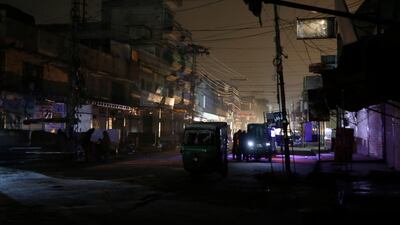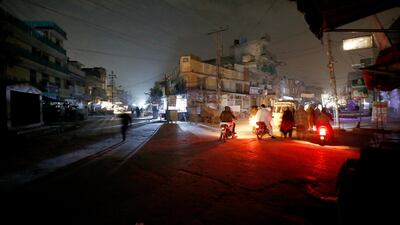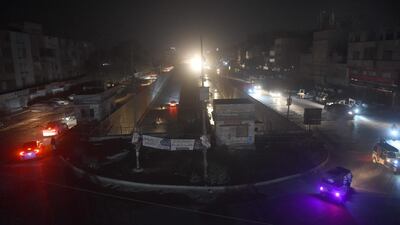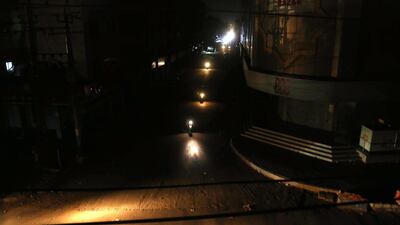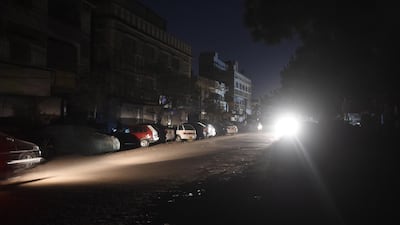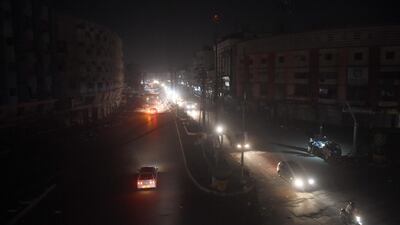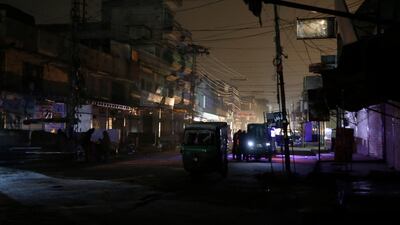Pakistan's worst power outage in several years plunged the country into darkness and led internet connectivity in the country to collapse.
An engineering fault in southern Pakistan shortly before midnight on Saturday tripped the country's grid and caused power plants to shut down across the country.
All of the country's major cities, including Karachi, Lahore, Peshawar and Islamabad, reported blackouts as the nation of more than 220 million was left largely without electricity.
Ghulam Mustafa, a labourer in Islamabad, said his entire neighbourhood had been plunged into darkness.
"I have spoken to family in Lahore and Multan, it is everywhere," he told The National. "We were used to this, but the power has been better. I pray for those who are in hospitals."
Engineers spent Sunday working on a phased restoration, as they brought power plants back online. Power in the capital, Islamabad, was quickly resumed and by the middle of the day, the government said supply had been partially restored in most areas of Punjab, as well as the economic hub Karachi in the south.
Netblockers, which monitors internet access, said the outage led connectivity to drop by nearly half as telecoms networks were affected.
"While not a total blackout, the disruption is consistent with a nation-scale power grid failure and is among the most severe such outages to strike the country in the observatory's records," the watchdog said.
There were no immediate reports of disruption at hospitals, which run back-up generators, and the overnight timing spared many businesses and factories.
The outage was caused by "an engineering fault" at 11.41pm on Saturday at the Guddu power plant in southern Sindh province, power minister Omar Ayub Khan told a press conference in Islamabad.
The fault triggered the shutdown of other power plants in seconds.
Mr Khan said the exact cause was still being investigated and he urged people to be patient as engineers fired up the main Tarbela power plant in the north-west, which would lead to a restoration of power in the rest of the country in phases.
Pakistan's once frequent power cuts and scheduled outages have become much less common in the past decade as Chinese investment has poured into the energy sector. Yet the country still comes in at 115 in a World Bank ranking of reliable electricity supplies, well below neighbouring India at 80 and Bangladesh at 101.
A delicate and interlinked grid system can see a problem in one part of the country cascade into breakdowns elsewhere.
The last major outage, in May 2018, saw the power supply partially disrupted for more than nine hours. Three years earlier, an apparent rebel attack on a key power line plunged about 80 per cent of Pakistan into darkness. That blackout was one of the worst in Pakistan's history and caused electricity to be cut in major cities nationwide.
Promises to fix Pakistan's electricity woes were a major part of the winning election platform of the Pakistan Muslim League (Nawaz) party in 2013. Power plants have been one of the cornerstones of Chinese investment in Pakistan under Beijing's Belt and Road initiative and several new coal-fired plants quickly added to Pakistan's generating capacity.
Yet the power grid still remains dilapidated. The World Bank estimates some 71 per cent of Pakistanis have access to electricity, compared with 95 per cent in India and 85 per cent in Bangladesh.
